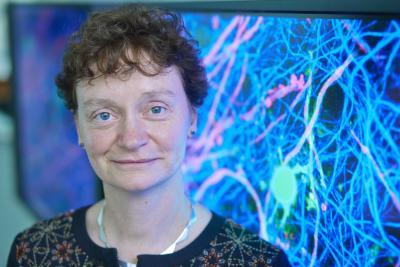Professor Anna Williams
Professor Williams runs a research group in the Centre of Regenerative Medicine, Institute of Regeneration and Repair at the University of Edinburgh, and is a consultant neurologist, with a busy multiple sclerosis clinic in the Anne Rowling Regenerative Neurology Clinic. Anna did her medical training at the University of Edinburgh Medical School, where she passed with honours and with a bachelor’s degree in Pathology. After a few years as a junior doctor, she carried out a PhD in the laboratory of Prof Peter Brophy, working on the action of Periaxin in inherited peripheral nerve demyelinating diseases. She then moved to Paris, France for a post doctoral position in the laboratory of Prof. Catherine Lubetzki, where she moved into studying myelin in the central nervous system, in the context of multiple sclerosis. She moved back to Edinburgh to start her own research group in 2008, initially funded by the Wellcome Trust, and then by the Chief Scientist’s Office. She received her personal chair in Regenerative Neurology in 2016. Her research group is interested primarily in how the myelin of the central nervous system is maintained and repaired in diseases such as small vessel disease and multiple sclerosis, with the ultimate aim of trying to improve this and therefore improve patient therapies.
Current Grant Awards
2020 - BHF Centre for Research Excellence pump priming grant to AW and Andy Baker (CVS) – PI - £47k
2018-2020: Roche. Transcriptomics in MS brain. £400k. PI.
2018-2020 MRC funding for Human Cell Atlas project – How heterogeneous are oligodendroglia from normal human brain and spinal cord? £450k. PI.
2018-2022: Dementia Research Initiative funding to Edinburgh funding ~£5million. (co-applicant)
2019-2022 MRC/MS Society UK - Do adult human oligodendrocytes remyelinate poorly and can we change this to better treat progressive multiple sclerosis? £600k
2021-2026 MS Society UK Centre award - Co-applicant, £1.85 million.
Previous Grant awards
2016-2019: MS Society project grant, “Is Fractalkine (CX3CL1) a master regulator of remyelination in MS? £254k. PI.
2017-2019: MRC Regenerative Medicine Committee, Transplantation of "super-OPCs" to improve central nervous system remyelination. £300k. PI.
2013-2018: UKRMP Engineering and exploiting the stem cell niche - Co-applicant, with Hub receiving £5.6 million.
2013-2017 Scottish Senior Research Fellowship £330k
2015-2017 CNS slice cultures as a tool for remyelination research (PI). GSK £350k
2015-2017 Identification of selective and potent inhibitors of the Semaphorin 3A Receptor Neuropilin-1 interaction on oligodendrocyte precursor cells to promote remyelination in Multiple Sclerosis. Sanofi-Genzyme (PI). ~ £500k plus work ‘in kind’.
2016: Alzheimer’s Research UK Pilot Grant, Three-dimensional modelling of endothelial cell dysfunction in cerebral small vessel disease. £50k.
2015-2016 Optogenetic cell ablation in a focal CNS demyelination model in slice cultures. MS society innovative grant (PI). £40k.
2013-2014 CSO - Targeting OPC migration towards remyelination therapies in multiple sclerosis £95k.
2008-2013 Wellcome Trust Intermediate Fellowship - Semaphorins in the control of remyelination in multiple sclerosis- £824,795.
2011- 2012 CSO grant - co-applicant with Prof. Steve Anderton - Probing regulatory T cells in multiple sclerosis brain - £165k.
June-sept 2012 Wellcome Trust Institutional Strategic Support Fund (WT-ISSF)- Highly multiplexed single-cell RNA sequencing with Dr Keisuke Kaji and Dr Sally Lowell –- £20k
July -Nov 2012 Wellcome Trust Institutional Strategic Support Fund (WT-ISSF) - Label-free imaging of compact myelin;enabling high-throughput screens for novel remyelination therapies – with Prof. Alistair Elfick, Dr Rabah Mouras, School of Engineering, and Prof. Charles ffrench-Constant - £50k
Key publications
Rajani RM, Quick S, Ruigrok SR, Graham D, Harris SE, Verhaaren BFJ, Fornage M, Seshadri S, Atanur SS, Dominiczak AF, Smith C, Wardlaw JM, Williams A. Reversal of endothelial dysfunction reduces white matter vulnerability in cerebral small vessel disease. Sci Transl Med. 2018 Jul 4;10(448)
Publication link: pubmed.ncbi.nlm.nih.gov/29973407
Quick S, Moss J, Rajani RM, Williams A. A Vessel for Change: Endothelial Dysfunction in Cerebral Small Vessel Disease. Trends Neurosci. 2020 Dec 8:S0166-2236(20)30266-6.
Publication link: pubmed.ncbi.nlm.nih.gov/33308877
Related links


